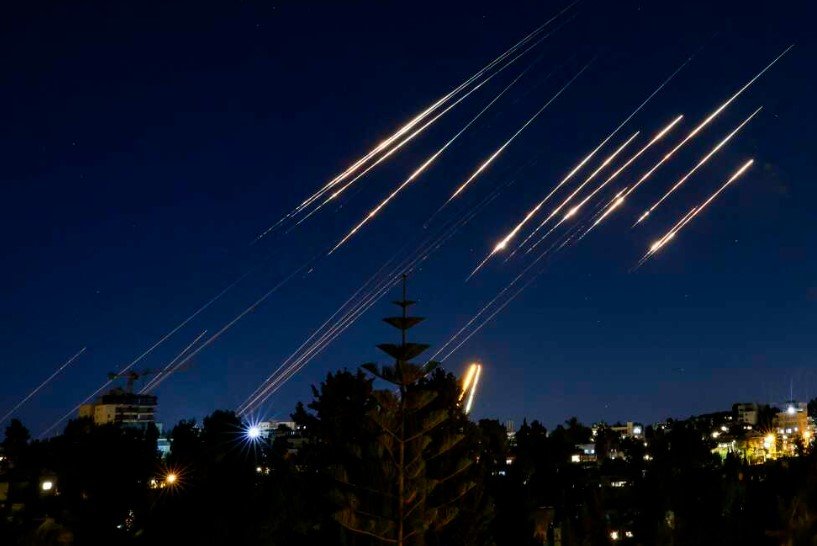A tense evening turned into a night of alarms and uncertainty as Iranian rockets lit up Israel’s skies, only to land in open terrain, sparing the nation from disaster.
Missile sirens blared across Tel Aviv, Beersheba, and central Israel late Monday night, leaving residents on edge for hours. But in the early hours of Tuesday, the IDF confirmed no significant casualties or structural damage had occurred, prompting authorities to lift shelter restrictions.
A Familiar Fear Grips the Night
It wasn’t the first time sirens echoed through Israeli cities, but this one had a different chill to it.
Shortly after 11:30 p.m., alerts were triggered across Tel Aviv, Beersheba, and parts of central Israel. The Israeli Defense Forces confirmed that between 10 and 20 ballistic missiles were launched from Iran.
As rockets flew overhead and interceptors lit up the skyline, many residents scrambled to bomb shelters while others huddled in stairwells or inner rooms.
By around 2 a.m., the IDF’s Home Front Command gave the all-clear: people could leave protected spaces. The situation had stabilized.

What We Know About the Missile Impact
The barrage may have sounded devastating, but only one missile actually landed — and it didn’t strike a populated area. It fell in the open, somewhere in Israel’s southern region.
A civilian report described seeing flames in a remote part of the Negev Desert. That fire was likely the result of the impact, but nothing’s confirmed yet.
Injuries? Nothing serious. A few people got hurt while rushing to shelters, according to Magen David Adom. But no direct hits, no hospitalizations, and no deaths.
IDF’s Assessment and Green Light
After reviewing radar data and impact reports, Israel’s military determined there was no further threat. The Home Front Command, which oversees civilian safety during such attacks, issued a nationwide update.
Everyone could safely return to normal activity. The danger had passed — at least for now.
That decision wasn’t made lightly. Officials weighed several scenarios before lifting the restriction. Here’s how it broke down:
| Event | Response Time | Public Advisory Issued | Casualties |
|---|---|---|---|
| Sirens in Tel Aviv & Beersheba | 11:30 PM | Shelter alert triggered | 0 |
| Missile Impact (Negev, unverified) | ~12:00 AM | Fire reported, unclear source | 0 |
| All-clear by Home Front Command | 2:00 AM | Allowed to exit shelters | Minor (due to panic) |
It’s rare for an event this dramatic to end with such minimal fallout. But that doesn’t mean people weren’t rattled.
Public Reaction: “We Couldn’t Sleep After That”
Across social media, the sentiment was the same — sheer terror, followed by a bizarre sense of anti-climax.
“I thought this was it. The siren went off and we just ran,” said a Tel Aviv resident. “Now they say it landed in the desert? That’s lucky, but still terrifying.”
Others weren’t so ready to breathe easy. Some pointed out that even one missile making it through could’ve spelled disaster.
Here’s what stuck with many:
-
The sirens didn’t just trigger in border areas — they rang out in the heart of the country.
-
The volume of rockets, even if intercepted, was higher than recent rounds.
-
The situation remains extremely volatile, with Iran and Israel exchanging threats daily.
A Fragile Calm for Now
Despite the lack of casualties, this isn’t likely to be the end. Military analysts say the attack was possibly a show of force — or a calculated warning.
Israel’s Iron Dome did its job, as did its Arrow system for long-range threats. But systems can be overwhelmed. There’s no iron-clad guarantee of protection if volleys increase.
And it’s not just about rockets. The psychological impact is starting to show. Parents kept kids home from school, and streets in Tel Aviv were quieter than usual on Tuesday morning.
You could call it shellshock, without the shell.
What Happens Next?
The coming hours and days will be crucial. On the international front, reactions have poured in — some urging restraint, others signaling quiet support for Israeli retaliation.
Meanwhile, inside Israel, emergency teams remain on high alert. Shelters haven’t been locked just yet, and security briefings are expected to continue throughout the week.
While the country resumes daily life, the tension hangs overhead like a cloud that didn’t quite rain.
